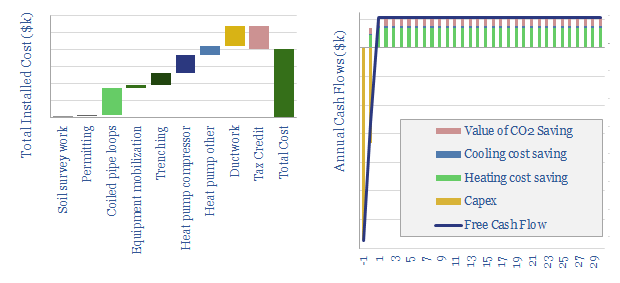This data-file models heat pump economics, costs, energy savings and potential CO2 savings of a ground source heat pump (GHP), compared to traditional home heating and cooling options.
A GHP approximately doubles the efficiency of conventional heating and cooling, through heat-exchange with the shallow earth, 30ft below the surface, which tends to remain at 10-15°C temperatures year-round.
The model can be stress-tested, flexing annual heating/cooling demands, coefficients of performance, as well as oil, gas, power and CO2 prices, to see how heat pump economics vary. Also included are a granular cost build-up for CHPs and our notes.
The capex costs of electric pumps in general, pump opex, pump energy consumption and the efficiency of pumps are reviewed from first principles in this data-file. Total pump costs can be ballparked at $600/kW/year of power, of which 70% is electricity, 20% operations and maintenance, 10% capex/capital costs. But the numbers vary.
Enhanced geothermal has accelerated by 3x in the past half-decade and this research note evaluates the energy economics of enhanced geothermal from first principles. Geothermal power is produced from 200 geothermal fields globally, feeding 16GW of power capacity, generating around 110 TWH of useful electricity, which equates to 0.4% of the world’s electricity and 0.15% of its total useful energy.
